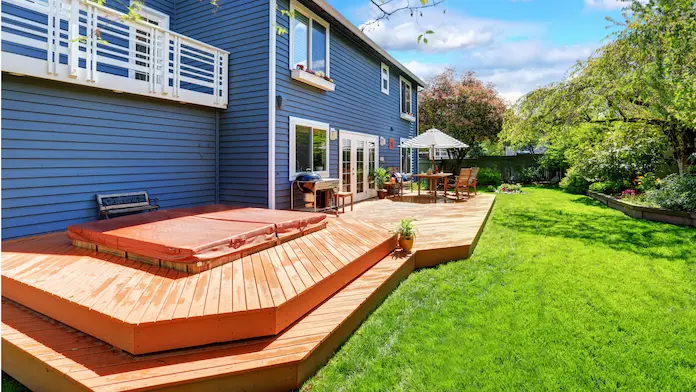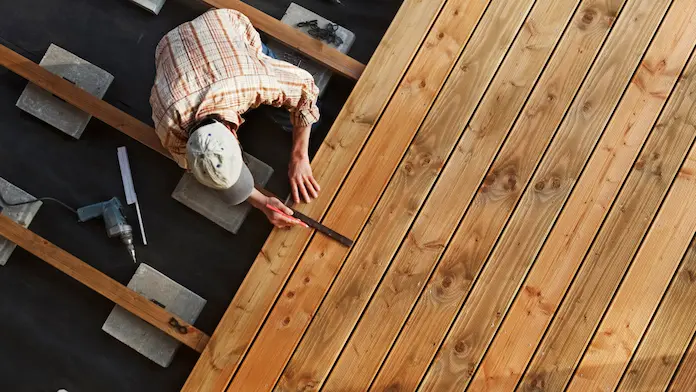How Much Does It Cost to Replace a Deck?
The average cost to replace the deck is around $11,000 but can range from $4,000 to $19,000. If repairs are all that’s needed, you’re looking at a lower cost, usually between $700 and $3,100. The decision to repair or replace depends on factors like the extent of the damage, the deck’s age, and its overall structural integrity.
What’s the Average Cost of Deck Replacement?

Statista reported that the number of single-family homes with completed decks in the U.S. has been on the rise since 2012, reaching its highest levels in 2021 and 2022.
With this growing trend, it’s important for homeowners to be aware of the associated costs.
The average cost for deck replacement can range between $4,000 and $19,000 with homeowners typically paying around $11,000.
However, keep in mind that the final price to replace deck boards depends on several factors such as deck size, deck material, extent of damage, contractor costs, any customizations, and the necessary prep work.
We’ll discuss all these factors in detail below along with tips on how you can save money.
Deck Replacement Cost Breakdown
While deck size and material are the primary factors affecting the cost of deck replacement, we’ll also explore other factors that impact the cost in detail, one by one.
Deck Size
The size of your deck plays a major role in replacement costs, as larger decks require more materials and labor.
Most decks are between 150 and 400 square feet, with construction costs typically ranging from $30 to $60 per square foot.
On average, this comes to about $45 per square foot, which includes materials, labor, local permits, and foundation costs.
- The Size of a Deck Average Cost
- 10-by-10 $4,500
- 12-by-12 $6,500
- 12-by-14 $7,600
- 14-by-14 $8,800
- 16-by-16 $11,500
- 20-by-20 $18,000
Deck Material
There are plenty of materials available for decks, such as wood, composite, metal, and PVC. The cost of deck replacement varies significantly depending on the material used. Here’s a breakdown of the costs according to material type:
- Deck Materia Average Cost per Sq Ft (labor + material)
- Composite $30 - $50
- Wood $25 - $65
- Vinyl $30 - $55
- Metal $30 - $55
Composite
Composite decking is crafted from a blend of wood fibers and recycled plastic, offering the look of wood without the hassle of high maintenance.
Composite deck costs usually range from $30 to $50 per square foot with the labor cost to replace deck boards with composite materials included in this estimate. If you’re only considering materials, the cost is typically between $12 and $30 per square foot.
While composite decks are durable and resistant to rot, insects, and fading, they can become hot when exposed to direct sunlight.
Wood
Wood decking is a popular option for outdoor spaces because of its natural beauty and versatility.
Pine is a cost-effective and commonly used wood. However, it requires chemical treatment to resist rot and insects, along with regular maintenance to prevent warping and extend its lifespan.
Cedar and redwood are naturally resistant to decay and insects, offering a longer lifespan of 15 to 30 years with proper care.
Exotic hardwoods like Ipe are incredibly durable, with a lifespan of up to 50 years, but they come at a higher cost.
The kind of wood you select will influence the overall cost. Typically, installation costs range from $20 to $50 per square foot, while materials alone usually run between $5 and $15 per square foot.
Vinyl
PVC (Polyvinyl Chloride) decking is made entirely from synthetic materials, making it highly durable.
This type of decking is extremely low maintenance, resistant to moisture, mold, and insects, and doesn’t fade or stain. It’s also lightweight but may have a less natural look and can become slippery when wet.
Installing vinyl decking typically costs between $24 and $40 per square foot. For materials alone, the cost ranges from $7 to $15 per square foot.
Metal
Metal decking, particularly aluminum and steel, is valued for its exceptional durability and low maintenance needs.
Aluminum decking is lightweight, rust-resistant, and stays cool underfoot, making it an excellent choice for hot climates.
Steel decking offers superior strength and load-bearing capacity, making it ideal for high-traffic areas or structures that need extra support. However, it is heavier and can rust if not properly treated.
Both aluminum and steel provide long-lasting, fire-resistant decking options, though they don’t offer the natural look of wood.
Metal decking materials typically cost between $10 and $20 per square foot, with professional installation ranging from $20 to $35 per square foot.
Contractor
Labor costs, ranging from $8 to $22 per square foot depending on the project’s complexity and location, make up a significant portion of the total expense.
For example, simpler designs tend to be cheaper since they require less time and expertise, whereas more complex designs with features like multiple levels or custom-built elements drive up labor costs.
Additionally, geographic location matters too – urban areas typically have higher labor costs than rural areas.
If you’re only looking to have your deck repaired, labor costs will likely fall between $100 and $500.
Additional Cost Factors to Consider for Deck Replacement or Repair

When redoing a deck, there are several other factors that can impact the overall cost of your project and should be taken into account.
Railing Replacement
- Deck Railing Material Cost per Linear Foot
- Wood $50 - $70
- Metal $60 - $90
- Composite $90 - $170
- Glass $150 - $220
The cost to replace deck railings varies significantly depending on the materials used, typically ranging from $40 to $250 per linear foot.
For instance, wood and metal railings tend to be more budget-friendly, while glass railings are on the pricier side.
Labor costs to install deck railings can add about $20 per linear foot.
Additionally, the style and complexity of the railings, such as those for stairs or gates, can increase the overall cost. Special features like premium colors, caps, and accessories can also contribute to higher expenses.
Season
During the winter, the lower demand for deck construction often results in reduced labor costs and potentially quicker permit approvals.
Contractors may offer discounts or have more availability during this off-season, making it a more budget-friendly time for deck replacement.
On the other hand, spring and summer are peak seasons, where higher demand can lead to increased labor costs and longer wait times for project completion. Material costs might also rise with seasonal demand.
Prep Work and Demolition
The cost of demolition usually ranges from $2 to $6 per square foot, depending on factors like the deck’s size, materials, and complexity.
Accessibility also affects the price. If the site is hard to reach, it may require extra labor and specialized equipment, which can drive up your costs.
To keep expenses in check, it’s wise to plan carefully and get multiple quotes.
Permits
Permit fees can go up to $600, depending on where you live and the project’s scope.
The permit process is essential to ensure the deck meets local building codes and safety standards with inspections required at different stages.
Skipping permits can lead to legal troubles, fines, or even the need to dismantle the deck, which could end up costing you more.
Customizations
Customizations can greatly increase the cost of replacing a deck due to the added complexity, extra materials, and more labor involved.
Features like built-in benches, lighting, or custom railings can drive up expenses significantly. For instance, curved designs or multi-level decks require more detailed construction and thus, higher labor costs.
How to Determine If Your Deck Needs to be Repaired or Replaced?
A thorough inspection by a professional is the best way to decide whether you’re replacing the deck or just repairing it, but here are some key signs that can help you determine that too.
Age of the Deck
Traditional wood decks generally last around 10-15 years, while composite decks can last longer, up to 25 years or more.
If your deck is nearing the end of its lifespan and showing signs of significant deterioration, it might be more cost-effective to replace it rather than repair it.
Structural Integrity
You should check for structural issues like sagging, leaning, or wobbling. These signs suggest that the deck's support system could be compromised, making replacement the safer choice.
However, if only a few boards or railings are loose, simple repairs might do the trick. But if the damage is widespread, replacement is usually the better option.
Rot and Decay
Rot is a major concern for wooden decks, especially in spots where moisture tends to get trapped.
If you discover extensive rot, particularly in key areas like the ledger board or joists, replacing the affected sections might be necessary. However, if the rot is limited to small areas, repairs could be a viable solution.
Damage and Wear
Check for excessive splintering, cracking, warping, or noticeable cosmetic damage.
If these problems are only in certain areas, repairs might help prolong the deck’s life. But if the damage is widespread, replacing the deck could be a better long-term fix.
Deck Renovation Cost vs. Repairs
If the cost of repairs is more than half the cost of replacing the deck, it’s generally wiser to opt for replacement.
Additionally, frequent repairs could signal that the deck is nearing the end of its useful life.
Pest Damage
Wood-loving insects like termites can quickly compromise a deck. If the damage is extensive, replacing the affected sections or the entire deck may be necessary.
Should You DIY Deck Repair or Replacement or Hire a Professional?

DIY repairs can be a great way to save money, especially for minor tasks like surface maintenance or replacing a few boards if you have the necessary skills and experience.
However, if your deck has structural issues like wobbly railings or sagging sections, it’s wise to hire a professional. They’ll ensure your deck is safe and up to code.
For a full deck replacement, you’ll need significant carpentry knowledge and must follow building codes closely. Mistakes can result in safety hazards and more expensive repairs later on.
While hiring a professional may cost more upfront, they provide expert craftsmanship, ensure compliance with regulations, and often complete the job more quickly, potentially saving you money on future repairs.
If your project is complex or involves structural repairs, or if you’re not experienced in carpentry, hiring a professional is the safer, more reliable choice.
When selecting a professional, check their online reviews and get quotes from multiple companies. You can also use a tool like HomeBuddy to find local experts who can design and install a deck that suits your style and budget or replace your old one with minimal hassle.
Money-Saving Tips for Your Deck Project
- Simplify the Design Stick to a basic rectangular or square shape that uses standard lumber lengths to minimize waste and reduce material costs.
- Choose Cost-Effective Materials Consider your climate and specific needs when selecting the most cost-effective material. For example, pressure-treated wood is often cheaper than composite materials.
- Time Your Project Wisely Plan your deck project during the off-season when contractors are less busy, potentially securing lower labor costs.
- DIY Where Possible Consider doing parts of the project yourself like staining or installing lighting to save on labor costs.
- Buy Materials in Bulk Purchase screws, nails, and other materials in bulk to save money on supplies.
- Shop for Sales Look out for clearance events or seasonal sales on decking supplies to reduce material costs.
Conclusion
Replacing a deck can cost anywhere from $4,000 to $19,000, with the final price depending on factors like the size, materials, customizations, permits, and labor.
While doing it yourself might save some money, it’s usually wiser to hire a professional who has the knowledge, skills, and experience to get the job done right the first time. You can use a tool like HomeBuddy to quickly connect with local experts for your deck replacement or repair needs.
Frequently Asked Questions
- Is it worth repairing a deck?
- Repairing a deck is often worth it if the damage is minor or localized and the overall structure is sound. It can be cost-effective, extend the deck’s life, and improve safety. However, extensive damage or an aging deck may require replacement to ensure long-term stability.
- Should you repair or replace your deck and when?
- You should repair your deck if the damage is minor or localized, and the structure is sound. Replace it if the damage is extensive, structural components are compromised, or the deck is nearing the end of its lifespan like 10 to 15 years for wood.
- Is repairing a deck cheaper than replacing it?
- It is generally less expensive to repair a deck than to replace it, especially when the damage is minor or localized. However, if the damage is extensive or structural, replacement might be more cost-effective in the long run.
- What’s the timeframe for replacing a deck?
- Replacing a deck typically takes 1 to 3 weeks, depending on factors like deck size, material, and weather conditions. Smaller, simpler decks might take just a few days, while larger or more complex projects require more time.
- What type of deck lasts the longest?
- Capped composite and PVC decking generally last the longest with lifespans of 25-50 years due to their resistance to rot, insects, and weathering. Among natural wood options, Ipe decking can last over 50 years with proper maintenance.
